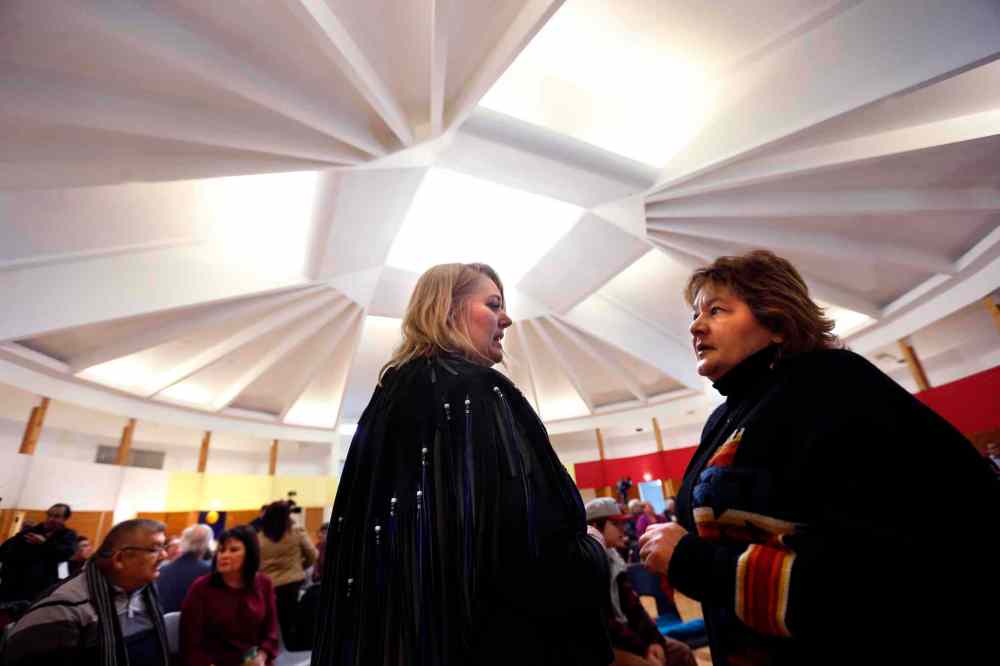Building relationships first step
Child welfare leader connecting chiefs, government
Advertisement
Read this article for free:
or
Already have an account? Log in here »
To continue reading, please subscribe:
Monthly Digital Subscription
$1 per week for 24 weeks*
- Enjoy unlimited reading on winnipegfreepress.com
- Read the E-Edition, our digital replica newspaper
- Access News Break, our award-winning app
- Play interactive puzzles
*Billed as $4 plus GST every four weeks. Offer only available to new and qualified returning subscribers. Cancel any time.
Read unlimited articles for free today:
or
Already have an account? Log in here »
Hey there, time traveller!
This article was published 15/12/2015 (3335 days ago), so information in it may no longer be current.
The province’s new point woman on child welfare says the government’s often fractious relationship with chiefs is on the mend, but righting the system will take time.
“I think relationships, whether they be personal or professional, have their ups and downs, their growing pains. There’s times of incredible strength and there’s times that are very challenging,” said Diane Kelly, the new assistant deputy minister in charge of child welfare. “I’m a big one for relationships, building trust, and I think we’re getting to that point.”
Kelly, a lawyer and former grand chief of Ontario’s Treaty 3, which includes bands in southeast Manitoba, is widely seen as the province’s pick to rescue devolution — the troubled process of handing more control over child welfare to First Nations.

In recent years, devolution has lurched from crisis to crisis, including child deaths, an avalanche of reviews, investigations and inquiries as well as controversies over the number of children languishing in hotels and too-high rates of aboriginal children in care. Behind the scenes, though, the province has quietly reclaimed control over the First Nations system.
Many indigenous leaders say devolution is increasingly stifled by “white” rules imposed and enforced by the ministry, which has consolidated power rather than handing it over to the two First Nations-run authorities. Three years ago, following a court dispute with chiefs over whether they could sit on the Southern Authority’s board, the province dissolved the board and appointed its own boss. A year ago, the province also took over the Northern Authority, eroding direct First Nations oversight of child welfare in the province.
“I don’t know if the train fell off the track, or did we just get caught up in the day to day and all of a sudden it’s five years later and what happened to devolution?” said Kelly. “I think the child welfare system is a big machine. It’s steeped in mainstream tradition, not First Nations tradition. There’s a lot of momentum. To slow that momentum and say, ‘OK, let’s go this way,’ — it takes a lot of effort.”
Kelly, who lived in Winnipeg but commuted to Kenora or worked in Fort Frances for much of her career, also served briefly as the director of Ma Mawi Wi Chi Itata. While she was grand chief in northwestern Ontario, she helped create the region’s customary care regime, which allows parents to retain guardianship of their children and a say in how they’re cared for, often by family, while apprehended.
Earlier this month, the province announced the first step toward its own customary care project at an event attended by the province’s grand chiefs and a dozen band chiefs. After years of discussion, Kelly helped kick-start customary care in Manitoba as a way to get devolution back on track.
Just six months into the job, Kelly casts herself as a peacemaker and is careful not to take strident positions on some of the key irritants between the chiefs and the province. That includes the use of the central case management software, called CFSIS, that some northern bands have balked at using, calling it an intrusive surveillance tool.
Kelly said she intends to launch a complete review of the massive standards manual, which many frontline social workers say is overly prescriptive and out of touch with the realities of life on a reserve.
“I’m not in this position to be battling with indigenous leadership. That’s not why I’m here, to find a hill that I can die on, or they can,” said Kelly. “I’m here to try and find a common denominator that respects their needs and their rights and their interests, along with my current role here in the province and my responsibilities.”
Provincial officials say both authorities should be turned back over to First Nations boards within weeks.
maryagnes.welch@freepress.mb.ca
History
Updated on Tuesday, December 15, 2015 7:19 AM CST: Replaces photo

